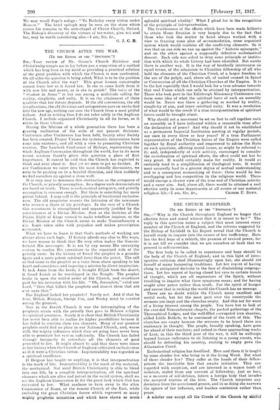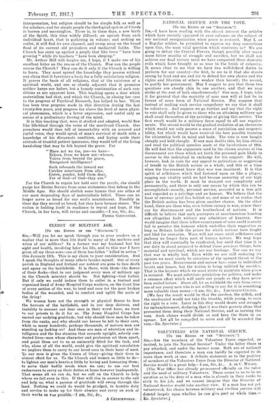THE CHURCH HAMPERED.
[To rue EDITOR OF THE " SPECTLTOR."] Sia,—" Why is the Church throughout England no longer that effective force and moral witness that it is meant to be ? " Tho reply to this question raises a subject that must interest every member of the Church of England, and the reforms suggested by the Bishop of Lichfield in his Report reveal that the Church is herself ready to inquire into the causes of her inefficiency. Here lies the first hope of a rebirth, the promise of revived power, for it is not till we consider that we are ourselves at fault that we proceed to self-correction.
The first body to be called to repentance and hope should be the body of the Church of England; and in this light of intro- spective criticism shed illuminatingly upon her, she should rid herself of many hampefing traditions. Let her repent of having clung to antiquated doctrine in the face of diminishing congrega- tions. Let her repent of having closed her eyes to certain trends of thought, which are all expressions of the Spirit, without troubling to inquire what these symptoms mean; and for having sought after power rather than truth. For the spirit of hunger and unrest that is racking the world the Church has no message.
There are no doubt within the Church many excellent and useful souls, but for the most part over the countryside the sermons are inept and the churches empty. And this not for want of a living interest among the people. You have but to look at the crowded Nonconformist chapels, the packed gatherings of the Theosophical Lodges, and the well-filled corrugated iron shanties, called Little Bethels, to be convinced of the truth of this. Tho churches are empty because the sermons to be heard there are stationary in thought. The people, broadly speaking, have gone far ahead of their teachers; and indeed in these approaching weeks of Lent, in this the third year of the war, it will be well-nigh beyond human endurance to sit listening to a young curate, who should be defending his country, reciting to empty pews the Athanasion Creed.
Ecclesiastical religion has fossilized. Here and there it is taught by some slender few who bring to it the living Word. But what of these slender few? They suffer at the hands of their fellow- priests the inevitable fate that awaits initiative. They are regarded with suspicion, and are interned in a waxen tomb of isolation, sealed from any current of fellowship; just as bees, as a measure of self-defence, intern a foreign body that invades the accepted routine of the hive. The Church misprises any deviation from the accustomed groove, and in so doing she narrows the sphere of her influence, and teaches contention rather than pence.
A scholar can accept all the Creeds of the Church by skilful
interpretation, but religion should be for simple folk as well as for scholars; and for simple people the theological system of Creeds is barren and meaningless. There is, in these days, a new birth of the Spirit, this time widely diffused; an uprush from each individual heart, that is gathering in volume; and seeking an outlet, it will find its own channel, and sweep away on tho broad flood of its current old prejudices and mediaeval faiths. The Church has come up against a people that like trees " have been growing " while its teachers " have been sleeping."
Mr. Arthur Hill will forgive me, I hope, if I make use of his excellent letter on the rescue of the Church. How can the people rescue the Church ? They can do it only if the Church is willing to learn. They must spread the knowledge they possess without any claim that it furnishes a basis for a fully satisfactory religion. It proves the basis of all religions, that of the existence of a spiritual world, and ono so closely adjacent that it promises neither harps nor haloes, but a homely continuation of such con- ditions as are apparent here. This teaching opens a door which materialism had shut, and which the Church, in closing her eyes to the progress of Psychical Research, has helped to bar. There has been true progress made in this direction during the last twenty-five years, and progress far above the level of mere physi- cal phenomena, which is a lower expression, and useful only as means of a preliminary freeing of the mind.
It is this teaching that, were it studied and adopted, would flow like life-blood through the veins of the moribund Church. Our preachers would then tell of immortality with an assured and joyful voice, they would speak of man's survival of death with a knowledge of his discarnate condition, and laying aside their attitude of trustful patient ignorance, they would tell of the living hand-clasp that may be felt beyond the grave. For
" Have not we too, yes—we have—
Echoes, from we know not—whence, Voices from beyond the grave, Recognised intelligence?
Such rebounds the inward ear Catches sometimes from afar, Listen, ponder, hold them dear, For of God—of God—they are."
For the Church to regain her hold over the people, she should purge her Divine Service from some statements that belong to the Middle Ages. Sho should abolish some hymns that are relics of re` our most desponding days of materialistic belief. These can no longer serve as bread for our soul's nourishment. Possibly in their day they served as bread, but they have become stones. The nation is holding itself in readiness to repent and hope, if the Church, in her turn, will revise and consider.--I am, Sir, a.,
PAMELA GLENCONNEE.



































 Previous page
Previous page